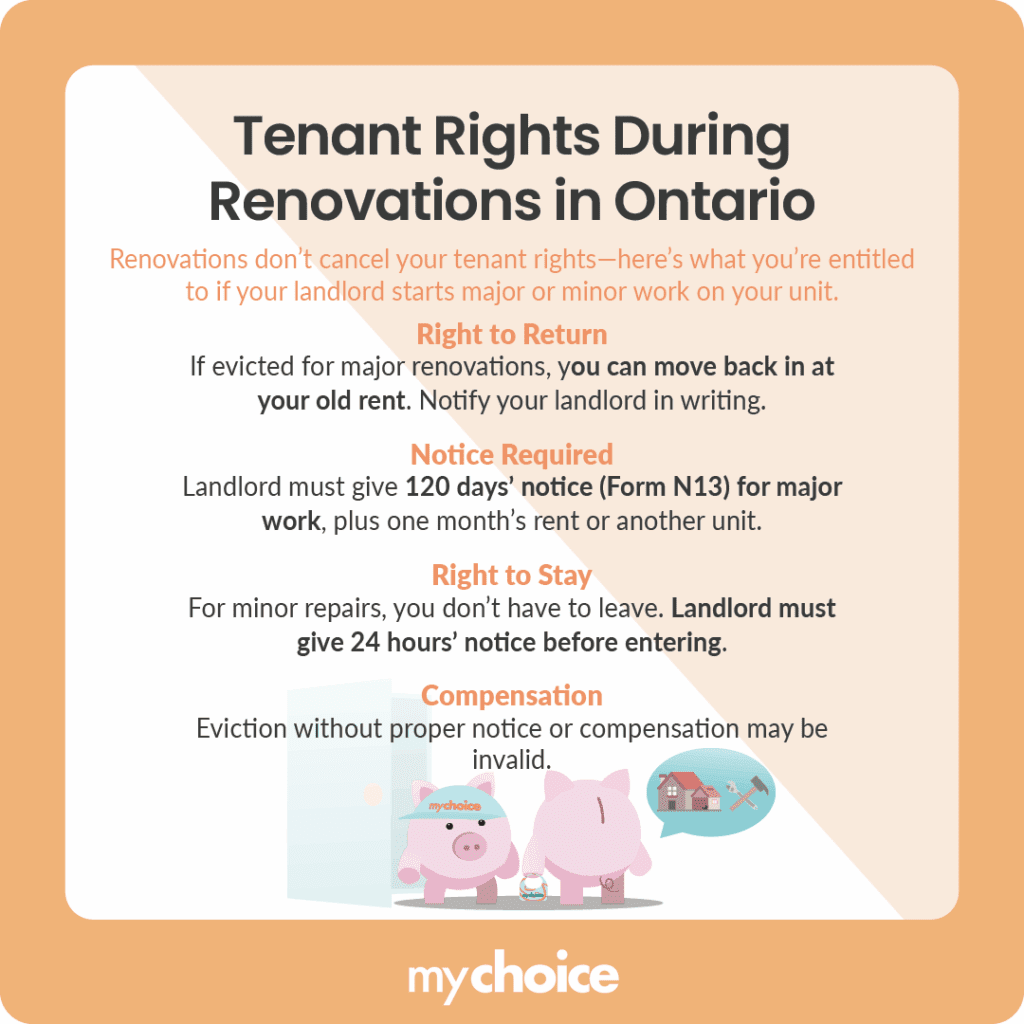Since the beginning of the COVID-19 pandemic, there’s been a noticeable uptick in “renovictions”, where landlords claim to be renovating a unit in order to evict tenants and charge higher rent to someone new. But if your landlord wants to do renovations, remember that you have rights under Ontario law that protect your housing stability, such as rights to compensation for disruption and reasonable access.
Can My Landlord Evict Me for Renovations in Ontario?
Yes, your landlord can evict you for renovations in Ontario, but only under specific legal conditions. Under the Residential Tenancies Act (RTA), a landlord can evict a tenant to perform major renovations only if the work requires the unit to be vacant.
This applies to significant repairs that are impossible to do while someone is living there, like removing walls, gutting plumbing systems, or replacing structural elements.
Here’s what your landlord has to do to legally evict you for renovations, under Toronto’s Rental Renovation Licence Bylaw:
- Obtain a licence before starting repairs or renovations.
- Give you a Form N13 (Notice to End your Tenancy) at least 120 days before the termination date.
- Clearly state the reason for eviction (i.e., substantial renovations).
- Provide compensation or accommodation plans and offer for you to return after the renovations.
- Apply to the Landlord and Tenant Board (LTB) for approval if the eviction is contested.
Keep in mind that not all renovations justify eviction. Cosmetic changes like painting or new flooring aren’t usually enough to legally evict someone. Check Tribunals Ontario’s Interpretation Guideline 12 for further guidance on when a landlord can apply to terminate your tenancy for renovations and personal use.
What Rights Do Tenants Have During Renovations in Ontario?
Landlords must follow specific rules when it comes to renovations, especially if the work affects your ability to safely and comfortably stay in your home. From your right to stay put during certain repairs to your right to move back in afterward, knowing where you stand can make a big difference:

Does My Landlord Have to Pay for My Hotel During Unit Repairs?
Landlords aren’t automatically required to pay for your hotel or other alternative accommodation unless the repairs make your unit unsafe or uninhabitable and you’re forced to leave through no fault of your own. This typically applies to emergency situations like flooding or fire, not planned renovations that involve legal eviction.
What Your Tenant Insurance Might Not Cover
Tenant insurance is a smart idea, but don’t assume it will automatically cover all disruptions during renovations. Most standard policies cover:
- Your personal belongings
- Liability (e.g. if someone gets hurt in your unit)
- Temporary living expenses (in specific situations where your unit becomes uninhabitable due to a covered event like a fire)
However, tenant insurance may not cover:
- Damage caused by your landlord’s contractors
- Construction delays
- Mould, if it’s considered gradual or due to poor maintenance
Always read your policy carefully and call your provider to confirm what’s included. If you don’t yet have tenant insurance, now’s a good time to look into it.
Municipal Protections: Does Your City Have Extra Safeguards?
Some cities in Ontario such as Toronto and Ottawa have passed or are developing tenant protection bylaws that go beyond provincial law. For example, Hamilton’s related bylaw requires landlords to hold a renovation license, show permits, engineer reports, and provide relocation assistance before an N13 notice takes effect.
Meanwhile in Toronto, landlords may be required to guarantee the unit will be offered back to the tenant and maintain livable conditions or provide accommodations during construction. Toronto has also passed a bylaw taking effect in July 2025 that requires a renovation licence within 7 days of an N13 and pre-renovation documents before starting work.
Check with your local municipality or tenant advocacy group to see if your city has added protections in place. They could make a major difference in your situation.
Key Advice from MyChoice
- Document your belongings with photos or videos. In the event of accidental damage or theft during renovations, a detailed inventory will make it easier to file a claim.
- Let your insurer know if your landlord is planning significant renovations. This can help prevent denied claims later due to “undisclosed material changes.”
- If your landlord offers a temporary rent reduction or agrees to cover hotel costs, get it in writing. Verbal agreements often don’t hold up in disputes.








